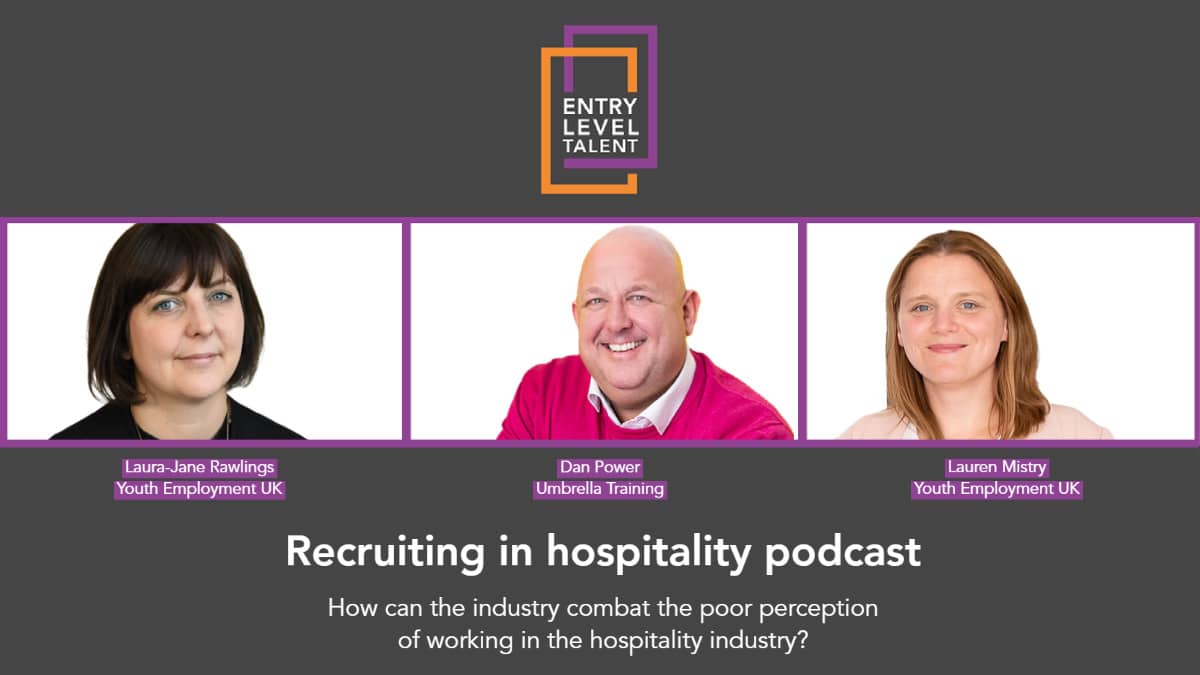How to challenge poor sector perception
What does the phrase ‘a job in hospitality’ conjure up for most young people and the people who influence them? Sector perception has been an issue for a long time but now it's vital to take action to change that impression and build a pool of engaged and enthusiastic hospitality talent.

It’s no secret that the hospitality sector has a mixed reputation, fuelled in part by the media highlighting low wages and long hours, and by the poor workplace experiences of previous generations, resulting in a lack of parental support.
But what about the good news stories that should be used to encourage entry level talent to see opportunities in hospitality as careers and not stopgaps? From becoming a chef, to marketing and finance, arranging events and even guest itineraries – the opportunities for anyone entering hospitality are vast.
At a recent series of roundtables events hosted by Caterer.com, Calvern James, Director at Caterer.com, joined industry leaders who came together to explore the core issues facing the sector and to discuss ways in which the key challenges around sector perception could be addresses.
What hospitality career information is available to young people?
There’s been a lot of chat about the lack of food tech in schools and the impact this is having. James Wingerath Commercial Director of Youth Employment UK believes that this is a red herring. ‘This only focuses on one aspect of a wide and diverse sector. Careers information is poor across secondary education and what there is, is geared towards food prep, kitchen roles and cooking.’
Calvern picked up James’s point. ‘Hospitality is so much more than cooking, with a wide range of opportunities not just in the kitchens; there are roles in finance, marketing, social media, as well as roles that could offer the chance to travel the world. Hospitality is about the people and the thousands of opportunities available.’
How Youth Employment UK is working with potential hospitality talent
Youth Employment UK is an independent, not for profit social enterprise founded in 2012 to tackle youth unemployment. A dedicated Skills and Careers Hub provides 14-24 year olds with free resources, advice and guidance. Designed with input from young people, the Skills and Careers Hub offers practical tools to support young people through education, transition into employment and beyond in a process of lifelong learning.
‘James continued, ‘We’re missing out on showcasing so many other roles, with access to any information in secondary schools almost non-existent. We must change that.’
‘Youth Employment UK offers a series of online programmes, linked directly to our career guidance hub. Employers can use this hub to promote their brands, job opportunities and to engage with entry level talent in a positive and informed way.’
How to engage parents and key influencers
Nicole Kirkland is Head of Talent and Resourcing at Interstate Hotels. She believes that changing perception is about educating the kids and also their parents. ‘For parents to back up their child’s choice and agree that hospitality is a great career choice for their children is a difficult thing without enough knowledge.’
‘We need to change perceptions earlier. Speak to children at a younger age. Traditionally, we’ve got involved at secondary school level and we should be reaching out to younger children. Only 3% of secondary and primary school-aged children would ever consider hospitality as an industry to work in.’
Reviewing the way hospitality businesses advertise vacancies
Dan Power, FIH, is Head of Projects at Umbrella Training. Dan posed the question, ‘How can the sector expect to recruit young people when job adverts ask for experience and skills? Most young people joining the sector have spent the past two years at home, unable to work. Job ads should be talking about personality and attitude. The industry should hire for attitude and train for skills.’
Hospitality opportunities, not careers?
Dan continued, ‘Job ads that ask for experience immediately alienate a chunk of potential hires and this is a massive own goal for the industry. Gen Z recruits are transient, so we need to pitch ‘opportunities’ rather than ’careers’. Careers speak to long-term commitment while opportunities mean a chance to try out the industry and see where it goes.’
One example of this is a current recruitment process which involves 4 separate assessments before a potential recruit speaks to a person – result: candidate drop-off is huge and brand perception suffers.
‘As an industry we need to sell the benefits in a way that appeals to Gen Z and entry level talent today. They’re not interested in 20 years from now – they want instant access to benefits and will find employers that offer this.’
Building a connection with young talent
The industry is already working hard to change perception at entry level but is it enough and what can we do as a sector to create lasting valuable connections with tomorrow’s talent?
Nicole believes that even if an applicant is unsuccessful, HR teams should keep in touch. ‘It’s about building relationships that will help with sector value proposition. Looking deeper into recruitment practices, businesses should think about creating a recruitment experience – one that allows candidates to positively see and feel employer brand values. Doing this will create advocacy and spread favourable word of mouth.’
‘It’s so important for a young person to have a favourable first impression of any hospitality business. We want them in our industry and a negative experience can have a significant detrimental impact on the business doing the interviewing. Young people share their experiences, good and bad, both in person and online and if perception in the talent pool is to change, these experiences have to be positive.’
What information is available about jobs in hospitality
Whilst there may not be a lot of information available in schools, there is a wealth of resources online. So much information in fact, it can become difficult for entry level talent to navigate in a positive and rewarding way.
The industry needs to join forces to produce information that highlights roles for all types of people – the ones who love numbers, the ones who care about detail, the ‘people’ people.
When it comes to sector perception, can too much information be a bad thing though? Dan thinks it might be. ‘There is a need for an industry benchmark to cut down on the ‘noise’ and clarify the traineeships, apprenticeships, mentoring schemes and work placement opportunities.’
Caterer.com are working in partnership with Youth Employment UK to supply accurate and up to date accounts of what working in hospitality is really like. Using ‘hospitality heroes’, young people already working in the sector, a series of videos showcase how vibrant and exciting hospitality is. You can watch our Hospitality Heroes here: https://www.caterer.com/advice/what-types-of-jobs-are-there-in-hospitality
How to interview Gen Z and entry level talent
An interview is a daunting prospect, so some hospitality brands are moving in a new direction, shying away from interviews and hosting live events instead, with very effective results. The upside of live events is that any job seeker who attends has made an effort to get there, is keen to find out more and is getting a first-hand look at brands and their culture.
For employers, live events are an opportunity for some face-to-face time with young people, in a relaxed informal environment, where they can showcase the sector in a positive and entertaining light. It’s fun and engaging and very quickly changes perceptions of hospitality.
Leah Lenihan is Senior Manager, Recruitment Marketing EMEA with Marriott International, and has first-hand experience of how successful open days can be. ‘We’ve been hosting open day recruitment events using a very personal approach. We don’t expect people to come along with their CV; it’s about meeting individuals and chatting about the opportunities within Marriott International. The process is fast, and the success rates are high – we recently recruited 106 new hires from one event.’
One final point on the interview process – many existing recruitment processes are long winded and can take weeks for a hire to be confirmed. Today’s talent wants fast answers and results and by speeding up time to hire employers are also feeding the need for Gen Z and young talent, who have grown up in the internet age, to move quickly into their new role in hospitality.
Research Findings: School leaver perceptions
- 55% think a job in hospitality is more of a temporary role than a career option
- 44% think the hospitality industry doesn’t allow for career progression
- 65% think that the government’s kickstart scheme doesn’t do enough to encourage people to enter the industry
- Top 3 factors which make hospitality an attractive career: good pay (31%), opportunity to learn new skills (30%), flexible hours (28%)
- Top 3 factors that make hospitality an unattractive industry to work in: poor pay (38%), stressful career (36%), anti-social hours (27%)
Source: Caterer.com commissioned research through Opinium to survey 2,000 nationally representative UK adults between 21st – 25th Jan 2022
More advice and insights to help you hire

Caterer.com hosted a series of roundtable discussions around the UK to address the current skills crisis and to gauge the opinion of hospitality leaders on sourcing entry level talent for the hospitality industry.

Addressing the skills shortage is an important topic as hospitality businesses recruit within a smaller talent pool. What can hospitality do to address the gap and what steps can employers take to upskill their existing workforce?

According to research carried out in 2019 by Chron, part of Hearst Media, diverse workplaces are more innovative, have better retention, and score highly on job satisfaction and business success. How can hospitality reach out to young people from diverse backgrounds and encourage them to think about the sector as an employer?

On average, the majority of people working in UK hospitality are aged between 20 and 24, according to research carried out by the CIPD in their 2019 Megatrends report. As an industry hospitality is powered by young talent at entry level, with many seeing hospitality as a stopgap job, looking for opportunities rather than a career. What can the sector do to engage and retain its young workforce?